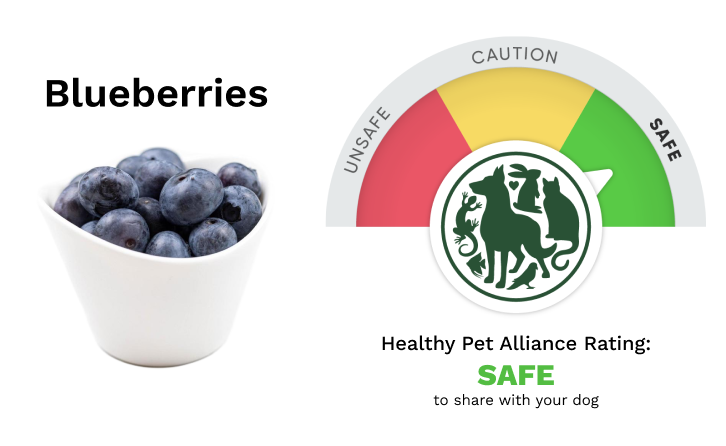

Yes, dogs can eat blueberries. In fact, blueberries contain vitamins, minerals, and antioxidants that may be beneficial to your dog's health and, because of their size, blueberries are not considered a choking hazard for any breeds. Continue reading below for more information.
Please note that before introducing any new food into your dog's diet, you should consult your veterinarian.
Table of Contents
Blueberries are low in calories and contain high amounts of vitamin C, fiber, and phytochemicals (naturally occurring chemical compounds found in plants). Due to the high level of nutrients and antioxidants they provide, blueberries can be an excellent snack for your dog. However, you should keep in mind blueberries are only good for dogs in moderation and as an occasional treat. All treats, including blueberries, should make up only 10% of the calories your dog eats each day.
Blueberries can be a great low-calorie snack for your furry friend because blueberries are an excellent source of vitamins, minerals, fiber, antioxidants, and phytochemicals (naturally occurring chemical compounds found in plants). Blueberries contain Vitamin C and fiber which are beneficial for any healthy dog's nutrition, as well as antioxidants which may reduce rates of cancer.
According to the Dog and Cat Food Ingredient Center, blueberries were found in 29% of the dry dog food recipes. Blueberries are found in nearly 1/3 of dog foods due to their health benefits and ability to preserve dog food.
Keep in mind, as with all snacks, blueberries are best in moderation. All fruits and vegetables should only make up about 20% of your dog's caloric intake.

While blueberries are typically safe for dogs, some dogs may respond to fruits differently. For example, the high fiber content of blueberries may improve digestive functions in one dog but upset another dog's stomach. If this is the first time you are giving your dog blueberries, feed them one at a time and monitor their behavior. If your pet is exhibiting strange behavior or signs of an adverse reaction (symptoms of allergic reaction and poisoning can be found later in this article), contact your veterinarian immediately.
While most dogs can eat blueberries, not all berries can be shared with your furry friend. Some berries can even be toxic for your pet.
Now that we know that dogs can eat blueberries, here are other berries that you can also share with your dog:
Not all berries are safe for dogs, so avoid feeding these to your dog:

The amount of blueberries you feed your dog and the way you feed them can have an impact on health. Continue reading below for more information on safe quantities and methods for feeding your dog blueberries.
If you're feeding blueberries to your dog as a treat, remember that treats should only account for 10% of your dog's caloric intake. Dogs can eat blueberries every day, but make sure it's in the right quantity. See the feeding guide below:

If your dog ate blueberries, don’t panic. Blueberries are not toxic for dogs in moderation.
However, if your dog is experiencing any of the following symptoms he or she might be having a bad reaction. Consult a veterinarian immediately if your dog is having any of the following symptoms:
Most dogs are not allergic to blueberries, but blueberries might contain a pesticide or other toxic contaminant that your dog is allergic to.
Blueberries are not poisonous for dogs, but if your dog experiences any of the following symptoms, consult your veterinarian immediately: